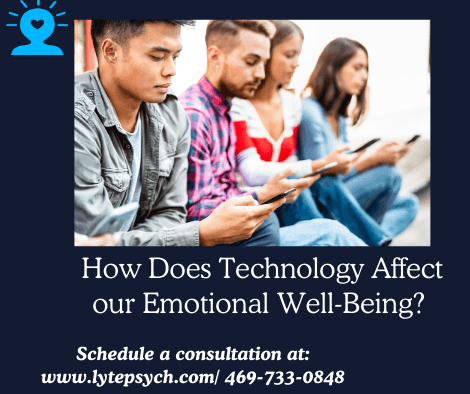Thu Sep 12 2024
Generation Z and Mental Health: How Does Technology Affect our Emotional Well-Being? Guide from Lyte Psychiatry (Affordable Therapist and Psychiatrist Near You) Best Adults and Adolescents Therapist and Psychiatrist Near You, Dallas, TX

Generation Z and Mental Health: How Does Technology Affect Our Emotional Well-Being?
Generation Z, those born roughly between 1997 and 2012, is the first generation to grow up with widespread access to the internet, smartphones, and social media from a young age. While technology offers numerous benefits, including connectivity, information access, and entertainment, it also poses significant challenges to emotional well-being.
The Impact of Technology on Mental Health
1. Social Media and Self-Esteem
Social media platforms like Instagram, Snapchat, and TikTok play a central role in the lives of many Gen Zers. While these platforms allow for connection and self-expression, they can also negatively impact self-esteem and body image. The constant exposure to carefully curated images and highlights of others’ lives can lead to:
Comparison and inadequacy: Seeing idealized versions of others can cause individuals to compare themselves unfavorably, leading to feelings of inadequacy or low self-worth.
Fear of missing out (FOMO): The fear of missing out on events, experiences, or trends seen on social media can lead to anxiety and a sense of isolation.
2. Screen Time and Sleep Disruption
Reduced sleep quality: Even if sleep duration is adequate, excessive screen time can reduce the quality of sleep, leaving individuals feeling less rested.
Mental health deterioration: Poor sleep is closely linked to increased risks of anxiety, depression, and other mental health issues.
3. Digital Overload and Anxiety
The constant influx of information through smartphones, social media, and news apps can lead to digital overload. This constant connectivity can make it difficult to disconnect and relax, contributing to:
Information overload: The overwhelming amount of information can lead to decision fatigue, stress, and difficulty focusing.
Increased anxiety: The pressure to keep up with online content, respond to messages, and stay informed can lead to heightened anxiety and feelings of being overwhelmed.
Difficulty relaxing: The constant need to check devices and stay connected can interfere with the ability to relax and enjoy offline activities.
4. Online Relationships vs. Real-Life Connections
While technology facilitates connections across distances, it can also create a barrier to deep, meaningful relationships. Relying heavily on digital communication can result in:
Superficial relationships: Online interactions can lack the depth and emotional connection of face-to-face communication, leading to feelings of loneliness.
Reduced social skills: Overreliance on digital communication can hinder the development of essential social skills, such as reading body language, active listening, and empathetic engagement.
5. The Pressure to Perform
Social media and other online platforms often create an environment where individuals feel pressured to perform or present a certain image to the world. This can lead to:
Burnout: The constant need to curate and maintain an online persona can lead to emotional exhaustion and burnout, particularly when trying to keep up with trends or expectations.
Strategies for Managing the Impact of Technology on Mental Health
While technology is an integral part of modern life, it’s important to use it in a way that supports rather than hinders mental health. Here are some strategies to help Generation Z manage the impact of technology on their emotional well-being:
1. Set Boundaries for Screen Time: Creating boundaries around screen time can help prevent the negative effects of digital overload and improve overall well-being.
2. Practice Mindful Technology Use: Mindful technology use involves being intentional and aware of how and why you use digital devices.
3. Cultivate Real-Life Connections: Balancing online interactions with real-life connections is essential for emotional well-being.
4. Seek Professional Help When Needed: If technology is having a significant negative impact on your mental health, it’s important to seek professional help.
Get Support for Technology-Related Mental Health Issues at Lyte Psychiatry
If you or someone you know is struggling with the impact of technology on mental health, Lyte Psychiatry in Dallas, TX, is here to help. Our team of skilled therapists and psychiatrists offers personalized, compassionate care to address the unique challenges faced by Generation Z.
To Schedule an appointment. Click Here
To see our services. Click Here
Call us if you have questions at 469-733-0848
Frequently Asked Questions (FAQ)
1. Can technology be beneficial for mental health?
Yes, technology can have positive effects on mental health, such as providing access to information, connecting with supportive communities, and offering tools for relaxation and mindfulness. The key is to use technology mindfully and in moderation.
2. How can I tell if technology is negatively impacting my mental health?
Signs that technology may be negatively impacting your mental health include feeling anxious or depressed after using social media, difficulty sleeping due to screen time, or feeling overwhelmed by the constant need to stay connected.
3. Is it normal to feel pressured by social media?
Yes, it’s common to feel pressured by the curated and often idealized images on social media. It’s important to recognize that these platforms often show only the highlights of others’ lives and not the full reality.
4. Can therapy help with issues related to technology use?
Yes, therapy can be very effective in addressing issues related to technology use, such as anxiety, depression, and low self-esteem. A therapist can help you develop healthier habits and coping strategies.
5. How can I support a friend or family member who is struggling with technology use?
Encourage open conversations about how technology affects them, offer support without judgment, and suggest setting boundaries around screen time. If needed, encourage them to seek professional help.